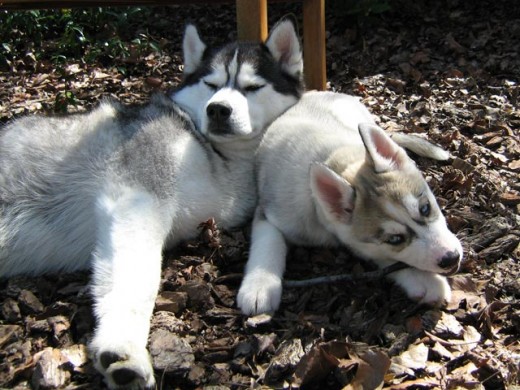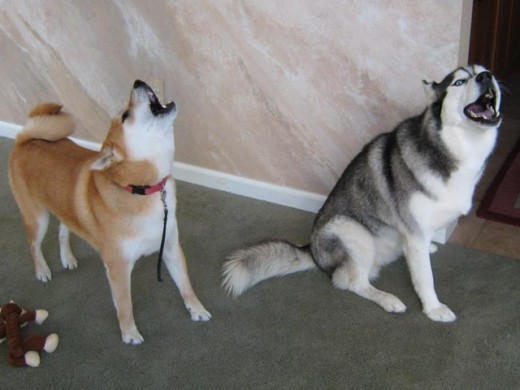- Are barking dogs born noisy, or were they made noisy by lack of training, management, and exercise?
- Do noisy dogs bark because they are unhappy?
- Are quiet dogs generally happy and more content?
I currently have two Siberian Huskies. Huskies are known for their night-time howling, which generally will not endear you to your neighbors.

Are Noisy Barking Dogs Born or Made?

My older Sibe Shania (3.5 years old), is a very quiet dog. She was born quiet and will only vocalize under very limited circumstances. In particular, she sings when she hears high pitched squeaky sounds like those coming from a squeaky soft toy. Small dogs that have high pitched barks or squeals can also get her to start vocalizing.
She stops when I tell her to – she was also born with a very sweet temperament. Shania has been this way since puppy-hood.
My younger Sibe Lara(6 months old), is a more noisy dog. She naturally likes to vocalize and she has a large range of vocal stylings including regular barks, howls, whines, and this very cute grumbling noise that she makes when she doesn’t get what she wants.
There is definitely a genetic component to the noisy dog syndrome.
However, we can also train our quiet dogs to bark more and to bark on command. Similarly, we can teach our noisy dogs to stop barking and redirect their energies into positive and enjoyable activities.

Are Quiet Dogs Happier Than Noisy Barking Dogs?

Usually, we associate quiet dogs with happiness and contentment. On the other hand, noisy barking dogs are thought to be aggressive, untrained, and unhappy.
Is this true? Are barking dogs less happy than their quiet counterparts?
Quiet dogs that only bark on rare occasions are generally easier to live with and handle. They do not bother the neighbors, and they seem less insistent with their needs because the verbal component is not present.
When Husky Shania wants something, she will come over to me and put her head on my lap. If I ignore her, she settles down by my feet and patiently waits until I am ready.
Did I already mention that Shania is sugar and spice and everything nice? 😀
However, Shania is also very quiet when she is not feeling well. One time, she had an allergic reaction to an insect bite, and her whole face swelled up. This is dangerous if not treated in a timely manner as it can cause gagging, breathing, and swallowing issues.

When this happened, Shania did not make a single sound. Instead, she went upstairs to rest and recuperate in her crate. I knew something was wrong because she usually likes staying downstairs with the whole pack. We checked her out, and immediately took her to the vet.
Just because a dog is quiet does not mean that she is happy, and it does not mean that everything is well. Quiet dogs simply communicate in other ways, and it is up to us to listen to their silent language.

Are Noisy Dogs Aggressive, Untrained, and Unhappy?

Dogs that are born noisy have a natural tendency to bark or vocalize in a wide variety of situations. My Husky puppy Lara barks when she is excited, she grumbles when she is frustrated, and sometimes she uses her patented puppy warcry when she is afraid or unsure.
It is much harder to train her to stay quiet because her natural instinct is to vocalize.
However, Lara is a pretty well-temperamented and happy puppy. In fact, she barks most when she is excited and playing with Shania and Shiba Inu Sephy.
Dogs bark for a variety of reasons including excitement, boredom, and simply to get our attention. They may also bark when they are frustrated, fearful, or stressed. These are the instances where the vocalization may be followed up by a bite, especially if the dog continues to feel threatened and has no other way of escape.

We can tell whether a dog is in an aggressive state by context, and by looking at the entire body of the dog. Some key signs of aggression may include raised hackles, stiff body posture, an unblinking stare, tight lips, and exposed front teeth.
However, barking alone does not necessarily mean that the dog is aggressive or stressed.
How to Stop Dog Barking

There are a variety of techniques to help reduce dog barking.
- Teach our dog to “Speak” and stay “Quiet” on command.
- Get our dog to do something else when he starts to bark.
- Remove our dog from the trigger object or event that causes his barking.
- Keep our dog busy and well exercised. It is less likely for a busy and tired dog to bark as a result of boredom or frustration.
Some people use anti-bark collars to stop their noisy dogs. However, doing so only suppresses the bark symptom rather than addressing the root of the barking behavior, e.g. the fear, frustration, or boredom.
In addition, anti-bark shock collars have many risks. Scientific studies show that shock collars may increase dog aggression and stress, thereby reducing quality of life.
Another very controversial ‘fix‘ for excessive barking is to surgically debark the dog. As with anti-bark collars, this procedure only deals with the noise and not with the cause of the behavior.
When dogs bark, they are trying to communicate with us.
Therefore, a much better way to stop dog barking is to identify why and what is causing our dog to bark. Then, we can address those triggers and not only reduce dog barking for the long-term, but also improve our dog’s quality of life.
For example, if our dog is fearful of other dogs and barks at them, we can slowly desensitize our dog to other dogs by helping him re-associate dogs with positive and rewarding outcomes.

Are Noisy Barking Dogs Less Happy Than Quiet Dogs?
Noisy barking dogs are not necessarily less happy than quiet dogs, they are simply more vocal about their needs.
The answer to noisy dogs is not to shock and surgically remove their voice. Rather, we want to listen to what they are saying and help them fulfill those needs.
After all, dogs do an excellent job at listening to us and fulfilling our needs. We should at least try to listen to them, and give back some of the happiness and joy that they so freely give to us.
